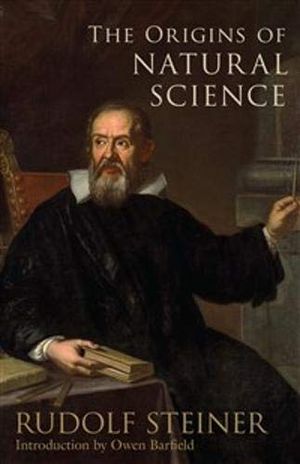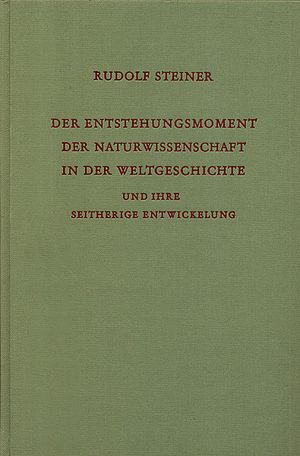GA 326: Difference between revisions
(Created page with "thumb thumb == The Origin of Natural Science in World History and its Development since then == === Der Entstehungsmoment der Nat...") |
No edit summary |
||
| (2 intermediate revisions by the same user not shown) | |||
| Line 6: | Line 6: | ||
Nine lectures, Dornach 24-28 December 1922 and 1-6 January 1923, and two answers to questions. | Nine lectures, Dornach 24-28 December 1922 and 1-6 January 1923, and two answers to questions. | ||
{{Quote|Modern science, and the scientism based on it, so far from being the only possible 'reality principle' is merely one way of conceiving the nature of reality; a way moreover that has arisen only recently and which there is no reason to supose will last forever.|Owen Barfield| | {{Quote|Modern science, and the scientism based on it, so far from being the only possible 'reality principle' is merely one way of conceiving the nature of reality; a way moreover that has arisen only recently and which there is no reason to supose will last forever.|Owen Barfield|(Introduction)}} | ||
This course of lectures is closely related to the problems and research tasks dealt with in the preceding special courses on natural science (see [[GA 320]] - [[GA 323]]), and yet is directed towards a more profound and principled overall human consideration of natural science as such. These lectures outline the subtle changes in our ideas and feelings in relation to the development of natural science. Through this, Steiner shows the significance of scientific research and the mode of thinking that goes with it. As we look at what technology has brought us, we may have a feeling like the pain we feel over the death of a loved one. According to Steiner, this feeling of loss will eventually become our most important stimulation to seek the spirit. | This course of lectures is closely related to the problems and research tasks dealt with in the preceding special courses on natural science (see [[GA 320]] - [[GA 323]]), and yet is directed towards a more profound and principled overall human consideration of natural science as such. These lectures outline the subtle changes in our ideas and feelings in relation to the development of natural science. Through this, [[Rudolf Steiner]] shows the significance of scientific research and the mode of thinking that goes with it. As we look at what [[technology]] has brought us, we may have a feeling like the pain we feel over the death of a loved one. According to Steiner, this feeling of loss will eventually become our most important stimulation to seek the spirit. | ||
== Literature == | == Literature == | ||
* [[Rudolf Steiner]], Norman Macbeth (Editor), Owen Barfield (Introduction), Maria St Goar (Translator): ''The Origins of Natural Science''. '''CW 326'''. SteinerBooks 1985. ISBN 978-0880101400 | * [[Rudolf Steiner]], Norman Macbeth (Editor), Owen Barfield (Introduction), Maria St Goar (Translator): ''The Origins of Natural Science''. '''CW 326'''. SteinerBooks 1985. ISBN 978-0880101400 [https://rsarchive.org/Lectures/GA326/English/AP1985/ rsarchive] | ||
=== German === | === German === | ||
* [[Rudolf Steiner]]: ''Der Entstehungsmoment der Naturwissenschaft in der Weltgeschichte und ihre seitherige Entwickelung'', [[GA 326]] (1977), ISBN 3-7274-3260-8 {{Lectures|326}} | * [[Rudolf Steiner]]: ''Der Entstehungsmoment der Naturwissenschaft in der Weltgeschichte und ihre seitherige Entwickelung'', [[GA 326]] (1977), ISBN 3-7274-3260-8 {{Lectures|326}} | ||
Latest revision as of 06:49, 21 July 2022


The Origin of Natural Science in World History and its Development since then
Der Entstehungsmoment der Naturwissenschaft in der Weltgeschichte und ihre seitherige Entwickelung
Nine lectures, Dornach 24-28 December 1922 and 1-6 January 1923, and two answers to questions.
„Modern science, and the scientism based on it, so far from being the only possible 'reality principle' is merely one way of conceiving the nature of reality; a way moreover that has arisen only recently and which there is no reason to supose will last forever.“
This course of lectures is closely related to the problems and research tasks dealt with in the preceding special courses on natural science (see GA 320 - GA 323), and yet is directed towards a more profound and principled overall human consideration of natural science as such. These lectures outline the subtle changes in our ideas and feelings in relation to the development of natural science. Through this, Rudolf Steiner shows the significance of scientific research and the mode of thinking that goes with it. As we look at what technology has brought us, we may have a feeling like the pain we feel over the death of a loved one. According to Steiner, this feeling of loss will eventually become our most important stimulation to seek the spirit.
Literature
- Rudolf Steiner, Norman Macbeth (Editor), Owen Barfield (Introduction), Maria St Goar (Translator): The Origins of Natural Science. CW 326. SteinerBooks 1985. ISBN 978-0880101400 rsarchive
German
- Rudolf Steiner: Der Entstehungsmoment der Naturwissenschaft in der Weltgeschichte und ihre seitherige Entwickelung, GA 326 (1977), ISBN 3-7274-3260-8 English: rsarchive.org German: pdf pdf(2) html mobi epub archive.org
 |
References to the work of Rudolf Steiner follow Rudolf Steiner's Collected Works (CW or GA), Rudolf Steiner Verlag, Dornach/Switzerland, unless otherwise stated.
Email: verlag@steinerverlag.com URL: www.steinerverlag.com. Index to the Complete Works of Rudolf Steiner - Aelzina Books A complete list by Volume Number and a full list of known English translations you may also find at Rudolf Steiner's Collected Works Rudolf Steiner Archive - The largest online collection of Rudolf Steiner's books, lectures and articles in English. Rudolf Steiner Audio - Recorded and Read by Dale Brunsvold steinerbooks.org - Anthroposophic Press Inc. (USA) Rudolf Steiner Handbook - Christian Karl's proven standard work for orientation in Rudolf Steiner's Collected Works for free download as PDF. |
